Artificial Intelligence's Impact on Accountants: A Report
VerifiedAdded on 2020/05/16
|10
|2818
|152
Report
AI Summary
This report provides a comprehensive overview of the impact of artificial intelligence (AI) on the accounting profession. It begins by defining AI and its applications in business, particularly within accounting. The report then delves into the specific ways AI is affecting accountants, including the automation of tedious tasks, improved data analysis, and enhanced decision-making capabilities. It explores the opportunities presented by AI, such as increased efficiency, improved audit quality, and the potential for remote work. However, the report also addresses the threats posed by AI, including job displacement, the need for retraining, and the risks associated with over-reliance on technology and data security. The conclusion emphasizes that while AI will transform the accountant's role, it will not eliminate it, but rather require accountants to develop new skills and focus on strategic initiatives. Finally, the report recommends that managers develop strategies for implementing and monitoring AI technologies to maximize benefits and mitigate risks. The report is a valuable resource for understanding the evolving landscape of accounting in the age of AI.
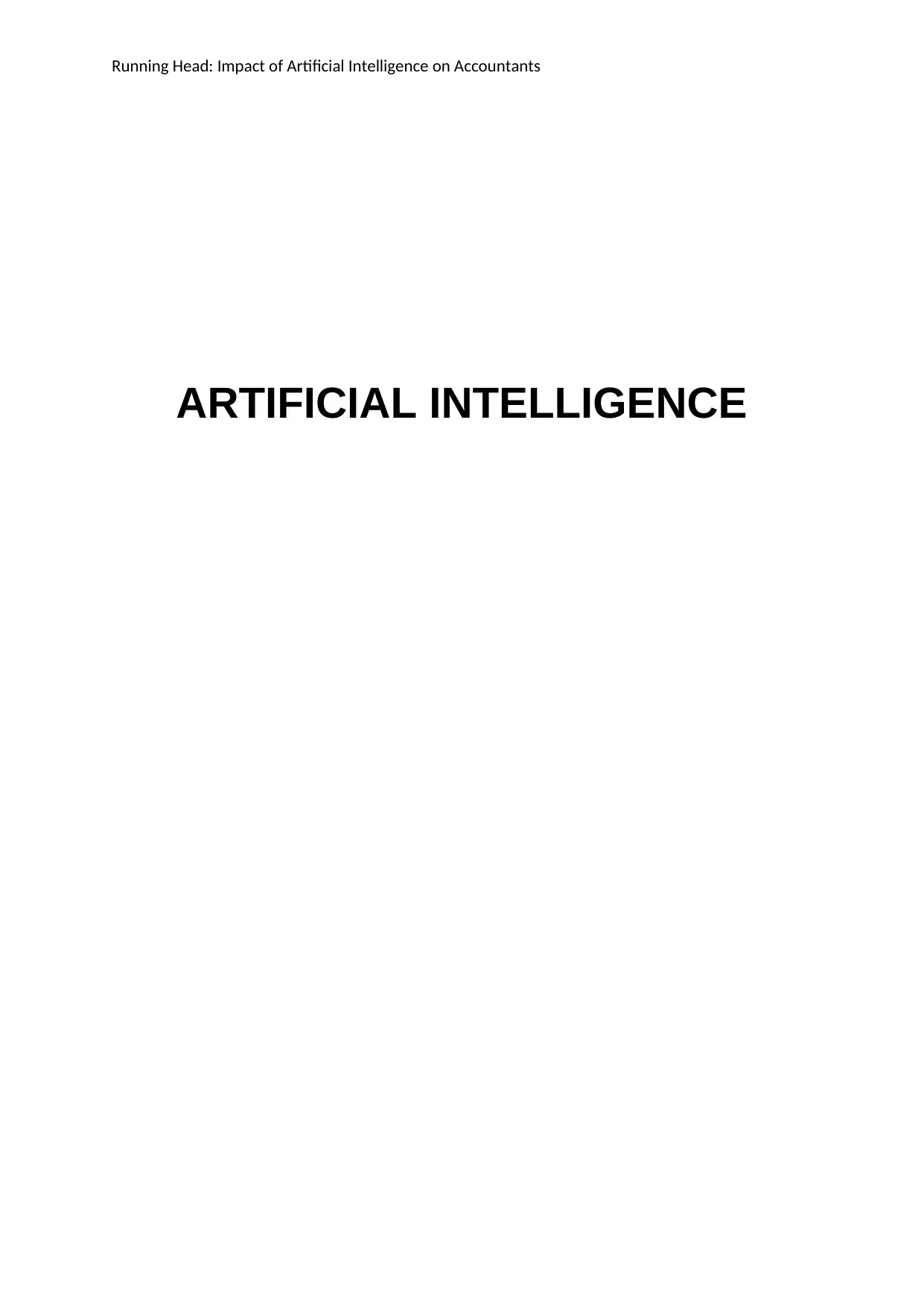
Running Head: Impact of Artificial Intelligence on Accountants
ARTIFICIAL INTELLIGENCE
ARTIFICIAL INTELLIGENCE
Paraphrase This Document
Need a fresh take? Get an instant paraphrase of this document with our AI Paraphraser
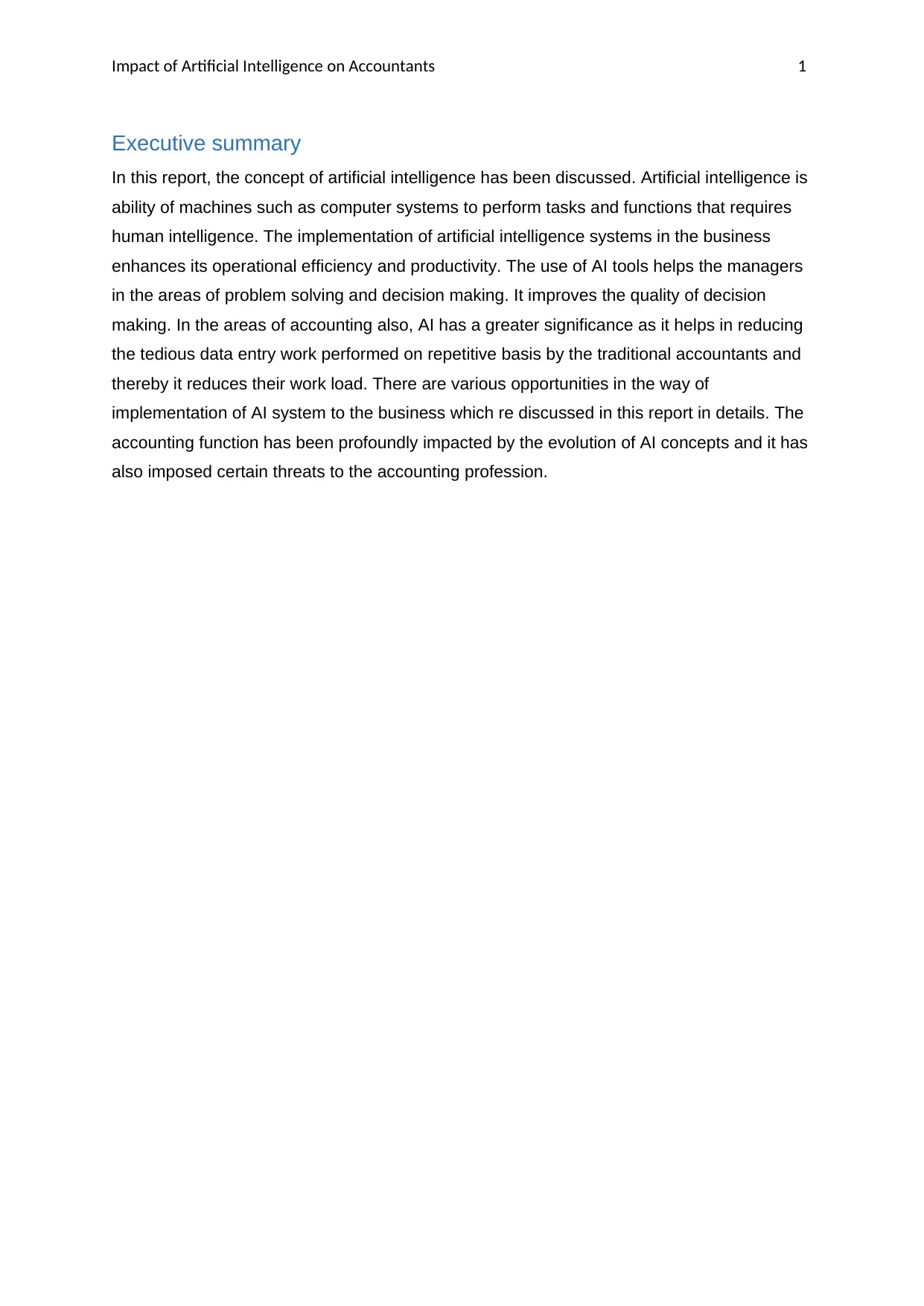
Impact of Artificial Intelligence on Accountants 1
Executive summary
In this report, the concept of artificial intelligence has been discussed. Artificial intelligence is
ability of machines such as computer systems to perform tasks and functions that requires
human intelligence. The implementation of artificial intelligence systems in the business
enhances its operational efficiency and productivity. The use of AI tools helps the managers
in the areas of problem solving and decision making. It improves the quality of decision
making. In the areas of accounting also, AI has a greater significance as it helps in reducing
the tedious data entry work performed on repetitive basis by the traditional accountants and
thereby it reduces their work load. There are various opportunities in the way of
implementation of AI system to the business which re discussed in this report in details. The
accounting function has been profoundly impacted by the evolution of AI concepts and it has
also imposed certain threats to the accounting profession.
Executive summary
In this report, the concept of artificial intelligence has been discussed. Artificial intelligence is
ability of machines such as computer systems to perform tasks and functions that requires
human intelligence. The implementation of artificial intelligence systems in the business
enhances its operational efficiency and productivity. The use of AI tools helps the managers
in the areas of problem solving and decision making. It improves the quality of decision
making. In the areas of accounting also, AI has a greater significance as it helps in reducing
the tedious data entry work performed on repetitive basis by the traditional accountants and
thereby it reduces their work load. There are various opportunities in the way of
implementation of AI system to the business which re discussed in this report in details. The
accounting function has been profoundly impacted by the evolution of AI concepts and it has
also imposed certain threats to the accounting profession.
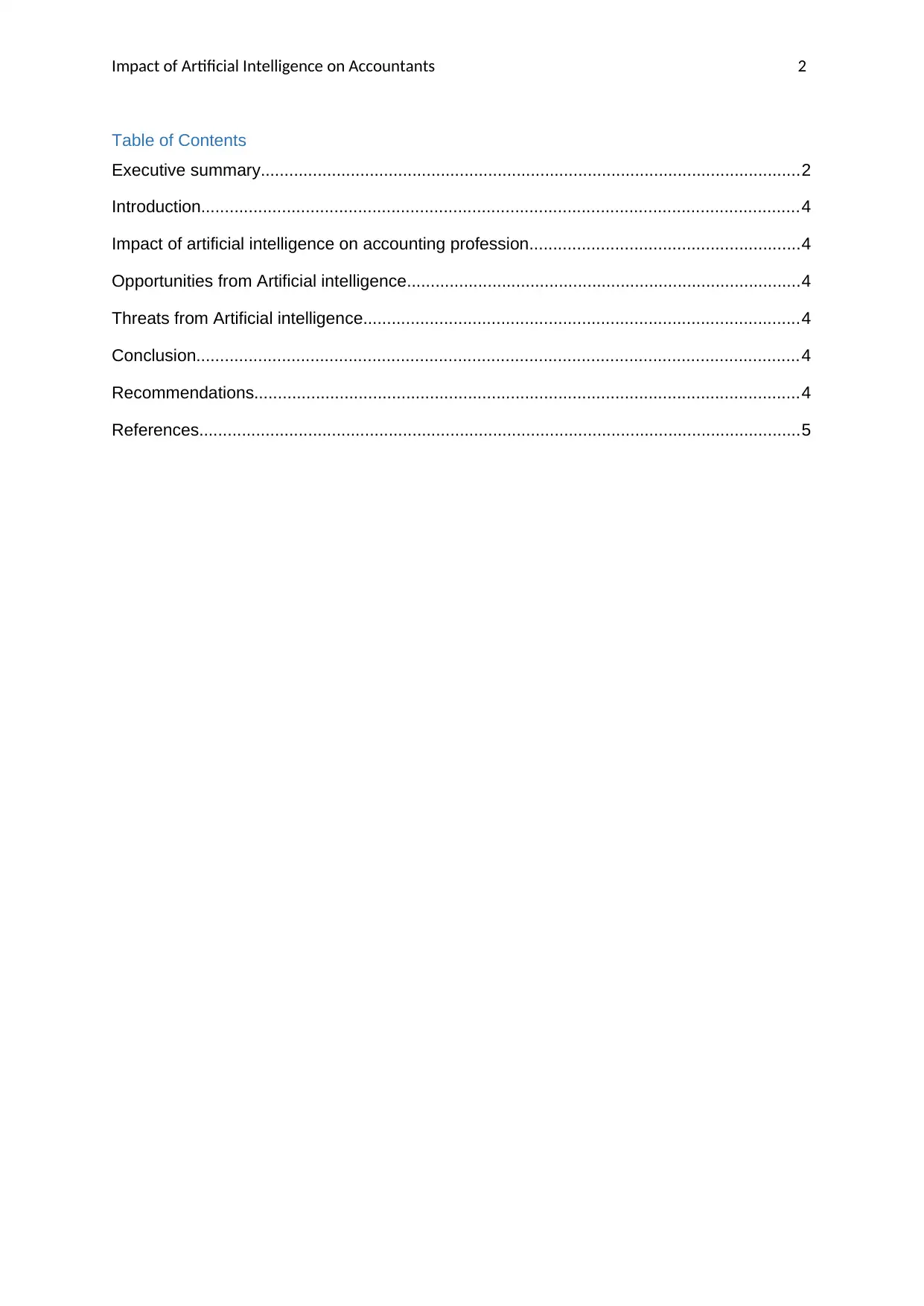
Impact of Artificial Intelligence on Accountants 2
Table of Contents
Executive summary..................................................................................................................2
Introduction..............................................................................................................................4
Impact of artificial intelligence on accounting profession.........................................................4
Opportunities from Artificial intelligence...................................................................................4
Threats from Artificial intelligence............................................................................................4
Conclusion...............................................................................................................................4
Recommendations...................................................................................................................4
References...............................................................................................................................5
Table of Contents
Executive summary..................................................................................................................2
Introduction..............................................................................................................................4
Impact of artificial intelligence on accounting profession.........................................................4
Opportunities from Artificial intelligence...................................................................................4
Threats from Artificial intelligence............................................................................................4
Conclusion...............................................................................................................................4
Recommendations...................................................................................................................4
References...............................................................................................................................5
⊘ This is a preview!⊘
Do you want full access?
Subscribe today to unlock all pages.

Trusted by 1+ million students worldwide
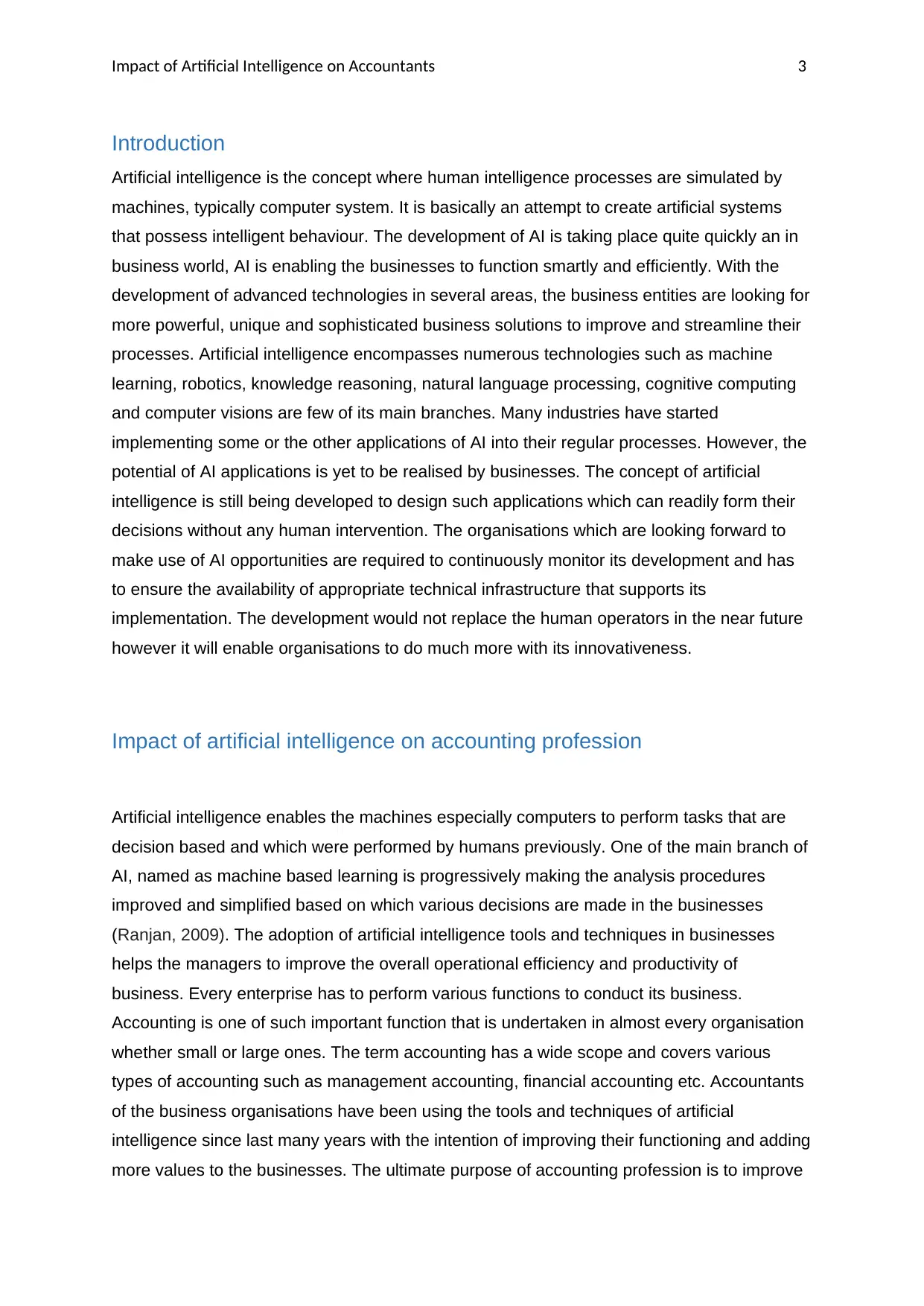
Impact of Artificial Intelligence on Accountants 3
Introduction
Artificial intelligence is the concept where human intelligence processes are simulated by
machines, typically computer system. It is basically an attempt to create artificial systems
that possess intelligent behaviour. The development of AI is taking place quite quickly an in
business world, AI is enabling the businesses to function smartly and efficiently. With the
development of advanced technologies in several areas, the business entities are looking for
more powerful, unique and sophisticated business solutions to improve and streamline their
processes. Artificial intelligence encompasses numerous technologies such as machine
learning, robotics, knowledge reasoning, natural language processing, cognitive computing
and computer visions are few of its main branches. Many industries have started
implementing some or the other applications of AI into their regular processes. However, the
potential of AI applications is yet to be realised by businesses. The concept of artificial
intelligence is still being developed to design such applications which can readily form their
decisions without any human intervention. The organisations which are looking forward to
make use of AI opportunities are required to continuously monitor its development and has
to ensure the availability of appropriate technical infrastructure that supports its
implementation. The development would not replace the human operators in the near future
however it will enable organisations to do much more with its innovativeness.
Impact of artificial intelligence on accounting profession
Artificial intelligence enables the machines especially computers to perform tasks that are
decision based and which were performed by humans previously. One of the main branch of
AI, named as machine based learning is progressively making the analysis procedures
improved and simplified based on which various decisions are made in the businesses
(Ranjan, 2009). The adoption of artificial intelligence tools and techniques in businesses
helps the managers to improve the overall operational efficiency and productivity of
business. Every enterprise has to perform various functions to conduct its business.
Accounting is one of such important function that is undertaken in almost every organisation
whether small or large ones. The term accounting has a wide scope and covers various
types of accounting such as management accounting, financial accounting etc. Accountants
of the business organisations have been using the tools and techniques of artificial
intelligence since last many years with the intention of improving their functioning and adding
more values to the businesses. The ultimate purpose of accounting profession is to improve
Introduction
Artificial intelligence is the concept where human intelligence processes are simulated by
machines, typically computer system. It is basically an attempt to create artificial systems
that possess intelligent behaviour. The development of AI is taking place quite quickly an in
business world, AI is enabling the businesses to function smartly and efficiently. With the
development of advanced technologies in several areas, the business entities are looking for
more powerful, unique and sophisticated business solutions to improve and streamline their
processes. Artificial intelligence encompasses numerous technologies such as machine
learning, robotics, knowledge reasoning, natural language processing, cognitive computing
and computer visions are few of its main branches. Many industries have started
implementing some or the other applications of AI into their regular processes. However, the
potential of AI applications is yet to be realised by businesses. The concept of artificial
intelligence is still being developed to design such applications which can readily form their
decisions without any human intervention. The organisations which are looking forward to
make use of AI opportunities are required to continuously monitor its development and has
to ensure the availability of appropriate technical infrastructure that supports its
implementation. The development would not replace the human operators in the near future
however it will enable organisations to do much more with its innovativeness.
Impact of artificial intelligence on accounting profession
Artificial intelligence enables the machines especially computers to perform tasks that are
decision based and which were performed by humans previously. One of the main branch of
AI, named as machine based learning is progressively making the analysis procedures
improved and simplified based on which various decisions are made in the businesses
(Ranjan, 2009). The adoption of artificial intelligence tools and techniques in businesses
helps the managers to improve the overall operational efficiency and productivity of
business. Every enterprise has to perform various functions to conduct its business.
Accounting is one of such important function that is undertaken in almost every organisation
whether small or large ones. The term accounting has a wide scope and covers various
types of accounting such as management accounting, financial accounting etc. Accountants
of the business organisations have been using the tools and techniques of artificial
intelligence since last many years with the intention of improving their functioning and adding
more values to the businesses. The ultimate purpose of accounting profession is to improve
Paraphrase This Document
Need a fresh take? Get an instant paraphrase of this document with our AI Paraphraser
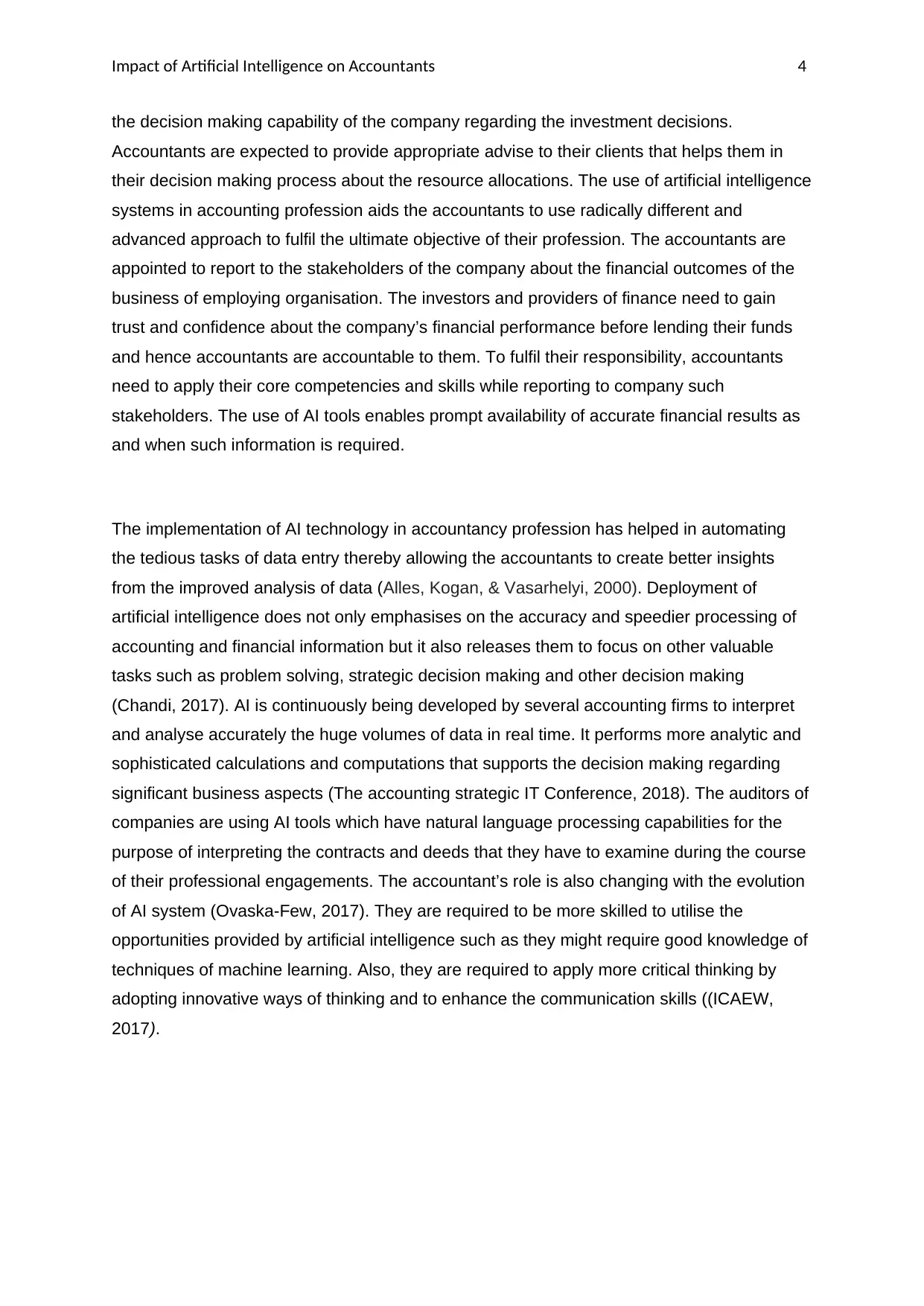
Impact of Artificial Intelligence on Accountants 4
the decision making capability of the company regarding the investment decisions.
Accountants are expected to provide appropriate advise to their clients that helps them in
their decision making process about the resource allocations. The use of artificial intelligence
systems in accounting profession aids the accountants to use radically different and
advanced approach to fulfil the ultimate objective of their profession. The accountants are
appointed to report to the stakeholders of the company about the financial outcomes of the
business of employing organisation. The investors and providers of finance need to gain
trust and confidence about the company’s financial performance before lending their funds
and hence accountants are accountable to them. To fulfil their responsibility, accountants
need to apply their core competencies and skills while reporting to company such
stakeholders. The use of AI tools enables prompt availability of accurate financial results as
and when such information is required.
The implementation of AI technology in accountancy profession has helped in automating
the tedious tasks of data entry thereby allowing the accountants to create better insights
from the improved analysis of data (Alles, Kogan, & Vasarhelyi, 2000). Deployment of
artificial intelligence does not only emphasises on the accuracy and speedier processing of
accounting and financial information but it also releases them to focus on other valuable
tasks such as problem solving, strategic decision making and other decision making
(Chandi, 2017). AI is continuously being developed by several accounting firms to interpret
and analyse accurately the huge volumes of data in real time. It performs more analytic and
sophisticated calculations and computations that supports the decision making regarding
significant business aspects (The accounting strategic IT Conference, 2018). The auditors of
companies are using AI tools which have natural language processing capabilities for the
purpose of interpreting the contracts and deeds that they have to examine during the course
of their professional engagements. The accountant’s role is also changing with the evolution
of AI system (Ovaska-Few, 2017). They are required to be more skilled to utilise the
opportunities provided by artificial intelligence such as they might require good knowledge of
techniques of machine learning. Also, they are required to apply more critical thinking by
adopting innovative ways of thinking and to enhance the communication skills ((ICAEW,
2017).
the decision making capability of the company regarding the investment decisions.
Accountants are expected to provide appropriate advise to their clients that helps them in
their decision making process about the resource allocations. The use of artificial intelligence
systems in accounting profession aids the accountants to use radically different and
advanced approach to fulfil the ultimate objective of their profession. The accountants are
appointed to report to the stakeholders of the company about the financial outcomes of the
business of employing organisation. The investors and providers of finance need to gain
trust and confidence about the company’s financial performance before lending their funds
and hence accountants are accountable to them. To fulfil their responsibility, accountants
need to apply their core competencies and skills while reporting to company such
stakeholders. The use of AI tools enables prompt availability of accurate financial results as
and when such information is required.
The implementation of AI technology in accountancy profession has helped in automating
the tedious tasks of data entry thereby allowing the accountants to create better insights
from the improved analysis of data (Alles, Kogan, & Vasarhelyi, 2000). Deployment of
artificial intelligence does not only emphasises on the accuracy and speedier processing of
accounting and financial information but it also releases them to focus on other valuable
tasks such as problem solving, strategic decision making and other decision making
(Chandi, 2017). AI is continuously being developed by several accounting firms to interpret
and analyse accurately the huge volumes of data in real time. It performs more analytic and
sophisticated calculations and computations that supports the decision making regarding
significant business aspects (The accounting strategic IT Conference, 2018). The auditors of
companies are using AI tools which have natural language processing capabilities for the
purpose of interpreting the contracts and deeds that they have to examine during the course
of their professional engagements. The accountant’s role is also changing with the evolution
of AI system (Ovaska-Few, 2017). They are required to be more skilled to utilise the
opportunities provided by artificial intelligence such as they might require good knowledge of
techniques of machine learning. Also, they are required to apply more critical thinking by
adopting innovative ways of thinking and to enhance the communication skills ((ICAEW,
2017).
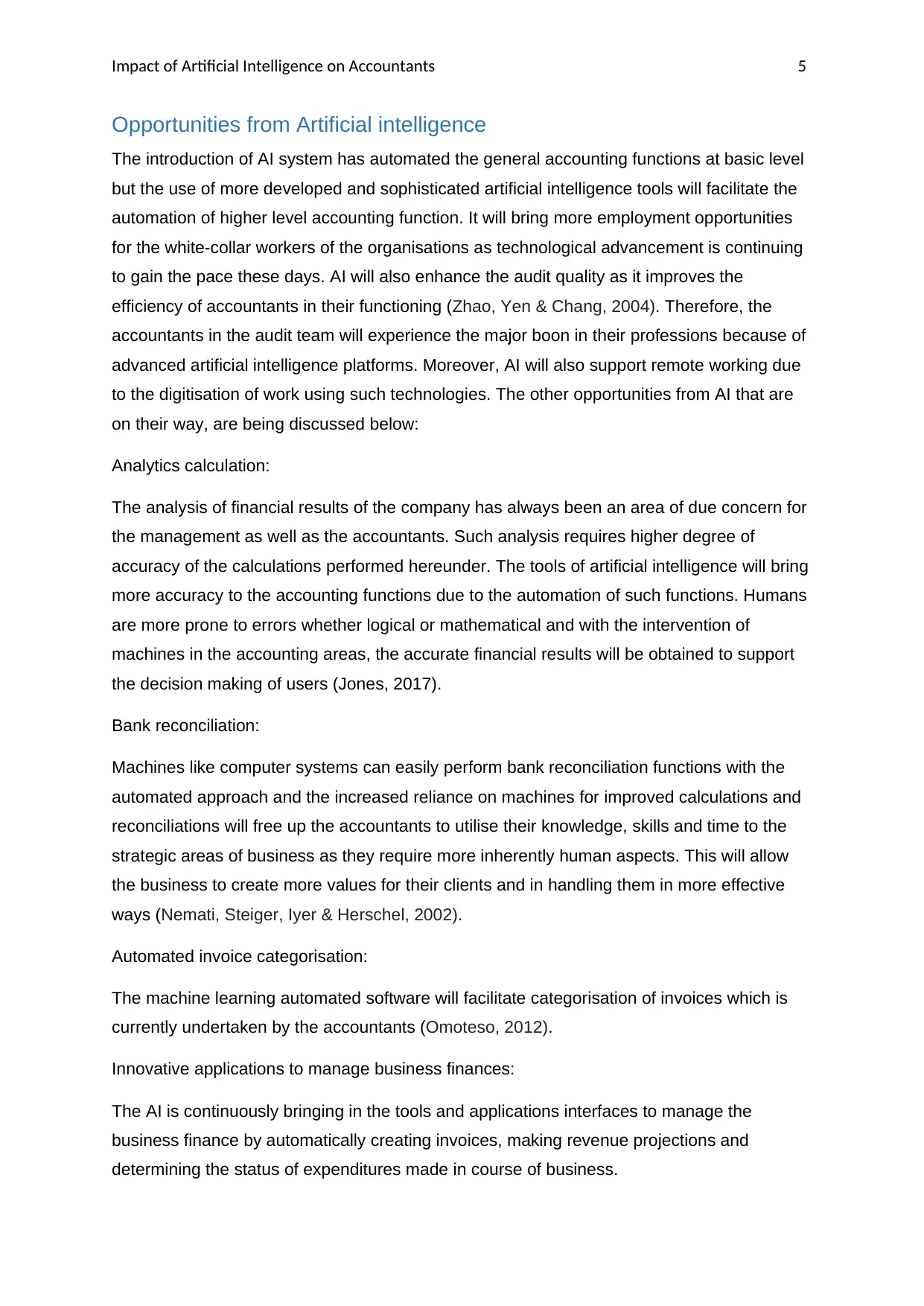
Impact of Artificial Intelligence on Accountants 5
Opportunities from Artificial intelligence
The introduction of AI system has automated the general accounting functions at basic level
but the use of more developed and sophisticated artificial intelligence tools will facilitate the
automation of higher level accounting function. It will bring more employment opportunities
for the white-collar workers of the organisations as technological advancement is continuing
to gain the pace these days. AI will also enhance the audit quality as it improves the
efficiency of accountants in their functioning (Zhao, Yen & Chang, 2004). Therefore, the
accountants in the audit team will experience the major boon in their professions because of
advanced artificial intelligence platforms. Moreover, AI will also support remote working due
to the digitisation of work using such technologies. The other opportunities from AI that are
on their way, are being discussed below:
Analytics calculation:
The analysis of financial results of the company has always been an area of due concern for
the management as well as the accountants. Such analysis requires higher degree of
accuracy of the calculations performed hereunder. The tools of artificial intelligence will bring
more accuracy to the accounting functions due to the automation of such functions. Humans
are more prone to errors whether logical or mathematical and with the intervention of
machines in the accounting areas, the accurate financial results will be obtained to support
the decision making of users (Jones, 2017).
Bank reconciliation:
Machines like computer systems can easily perform bank reconciliation functions with the
automated approach and the increased reliance on machines for improved calculations and
reconciliations will free up the accountants to utilise their knowledge, skills and time to the
strategic areas of business as they require more inherently human aspects. This will allow
the business to create more values for their clients and in handling them in more effective
ways (Nemati, Steiger, Iyer & Herschel, 2002).
Automated invoice categorisation:
The machine learning automated software will facilitate categorisation of invoices which is
currently undertaken by the accountants (Omoteso, 2012).
Innovative applications to manage business finances:
The AI is continuously bringing in the tools and applications interfaces to manage the
business finance by automatically creating invoices, making revenue projections and
determining the status of expenditures made in course of business.
Opportunities from Artificial intelligence
The introduction of AI system has automated the general accounting functions at basic level
but the use of more developed and sophisticated artificial intelligence tools will facilitate the
automation of higher level accounting function. It will bring more employment opportunities
for the white-collar workers of the organisations as technological advancement is continuing
to gain the pace these days. AI will also enhance the audit quality as it improves the
efficiency of accountants in their functioning (Zhao, Yen & Chang, 2004). Therefore, the
accountants in the audit team will experience the major boon in their professions because of
advanced artificial intelligence platforms. Moreover, AI will also support remote working due
to the digitisation of work using such technologies. The other opportunities from AI that are
on their way, are being discussed below:
Analytics calculation:
The analysis of financial results of the company has always been an area of due concern for
the management as well as the accountants. Such analysis requires higher degree of
accuracy of the calculations performed hereunder. The tools of artificial intelligence will bring
more accuracy to the accounting functions due to the automation of such functions. Humans
are more prone to errors whether logical or mathematical and with the intervention of
machines in the accounting areas, the accurate financial results will be obtained to support
the decision making of users (Jones, 2017).
Bank reconciliation:
Machines like computer systems can easily perform bank reconciliation functions with the
automated approach and the increased reliance on machines for improved calculations and
reconciliations will free up the accountants to utilise their knowledge, skills and time to the
strategic areas of business as they require more inherently human aspects. This will allow
the business to create more values for their clients and in handling them in more effective
ways (Nemati, Steiger, Iyer & Herschel, 2002).
Automated invoice categorisation:
The machine learning automated software will facilitate categorisation of invoices which is
currently undertaken by the accountants (Omoteso, 2012).
Innovative applications to manage business finances:
The AI is continuously bringing in the tools and applications interfaces to manage the
business finance by automatically creating invoices, making revenue projections and
determining the status of expenditures made in course of business.
⊘ This is a preview!⊘
Do you want full access?
Subscribe today to unlock all pages.

Trusted by 1+ million students worldwide
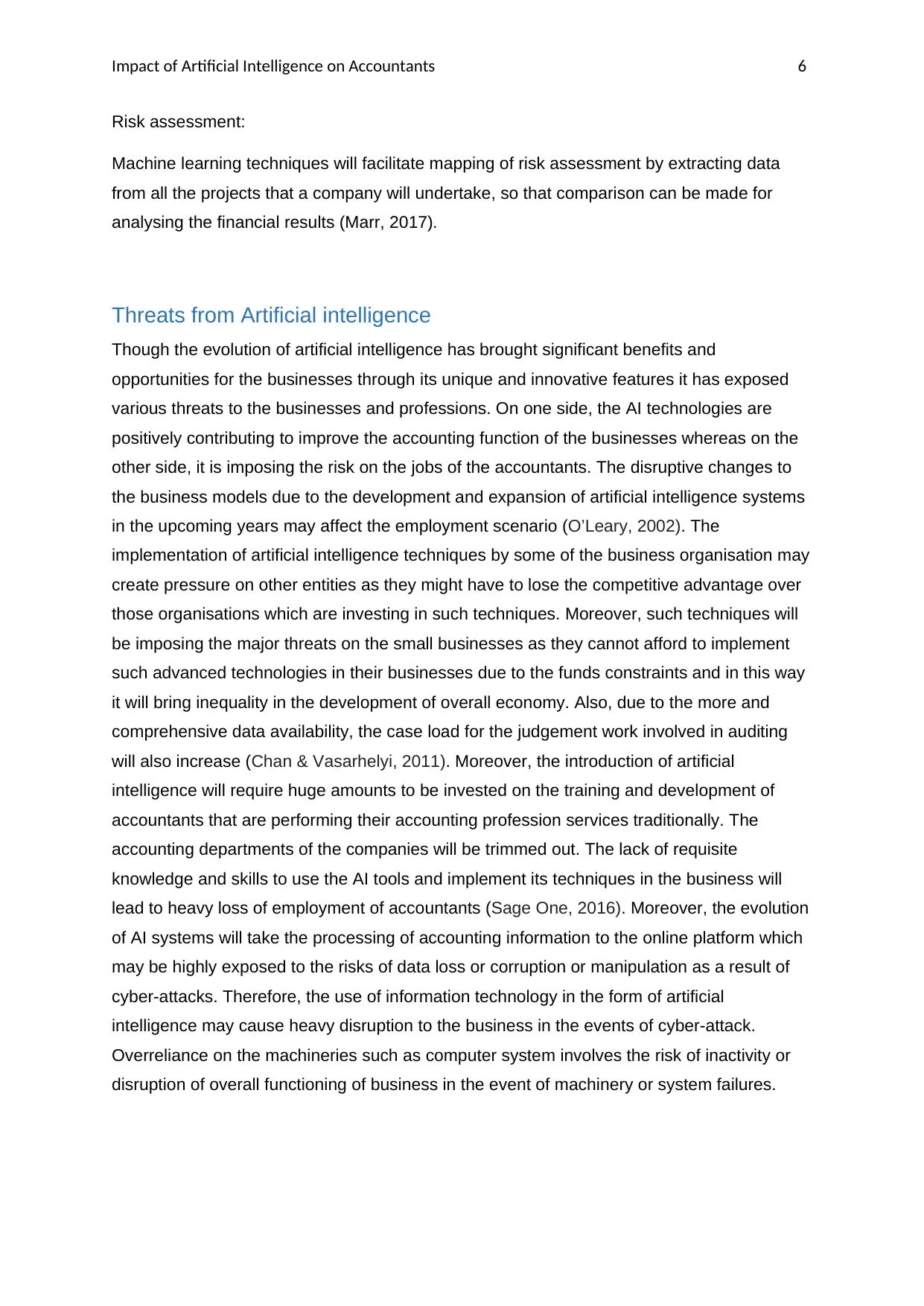
Impact of Artificial Intelligence on Accountants 6
Risk assessment:
Machine learning techniques will facilitate mapping of risk assessment by extracting data
from all the projects that a company will undertake, so that comparison can be made for
analysing the financial results (Marr, 2017).
Threats from Artificial intelligence
Though the evolution of artificial intelligence has brought significant benefits and
opportunities for the businesses through its unique and innovative features it has exposed
various threats to the businesses and professions. On one side, the AI technologies are
positively contributing to improve the accounting function of the businesses whereas on the
other side, it is imposing the risk on the jobs of the accountants. The disruptive changes to
the business models due to the development and expansion of artificial intelligence systems
in the upcoming years may affect the employment scenario (O’Leary, 2002). The
implementation of artificial intelligence techniques by some of the business organisation may
create pressure on other entities as they might have to lose the competitive advantage over
those organisations which are investing in such techniques. Moreover, such techniques will
be imposing the major threats on the small businesses as they cannot afford to implement
such advanced technologies in their businesses due to the funds constraints and in this way
it will bring inequality in the development of overall economy. Also, due to the more and
comprehensive data availability, the case load for the judgement work involved in auditing
will also increase (Chan & Vasarhelyi, 2011). Moreover, the introduction of artificial
intelligence will require huge amounts to be invested on the training and development of
accountants that are performing their accounting profession services traditionally. The
accounting departments of the companies will be trimmed out. The lack of requisite
knowledge and skills to use the AI tools and implement its techniques in the business will
lead to heavy loss of employment of accountants (Sage One, 2016). Moreover, the evolution
of AI systems will take the processing of accounting information to the online platform which
may be highly exposed to the risks of data loss or corruption or manipulation as a result of
cyber-attacks. Therefore, the use of information technology in the form of artificial
intelligence may cause heavy disruption to the business in the events of cyber-attack.
Overreliance on the machineries such as computer system involves the risk of inactivity or
disruption of overall functioning of business in the event of machinery or system failures.
Risk assessment:
Machine learning techniques will facilitate mapping of risk assessment by extracting data
from all the projects that a company will undertake, so that comparison can be made for
analysing the financial results (Marr, 2017).
Threats from Artificial intelligence
Though the evolution of artificial intelligence has brought significant benefits and
opportunities for the businesses through its unique and innovative features it has exposed
various threats to the businesses and professions. On one side, the AI technologies are
positively contributing to improve the accounting function of the businesses whereas on the
other side, it is imposing the risk on the jobs of the accountants. The disruptive changes to
the business models due to the development and expansion of artificial intelligence systems
in the upcoming years may affect the employment scenario (O’Leary, 2002). The
implementation of artificial intelligence techniques by some of the business organisation may
create pressure on other entities as they might have to lose the competitive advantage over
those organisations which are investing in such techniques. Moreover, such techniques will
be imposing the major threats on the small businesses as they cannot afford to implement
such advanced technologies in their businesses due to the funds constraints and in this way
it will bring inequality in the development of overall economy. Also, due to the more and
comprehensive data availability, the case load for the judgement work involved in auditing
will also increase (Chan & Vasarhelyi, 2011). Moreover, the introduction of artificial
intelligence will require huge amounts to be invested on the training and development of
accountants that are performing their accounting profession services traditionally. The
accounting departments of the companies will be trimmed out. The lack of requisite
knowledge and skills to use the AI tools and implement its techniques in the business will
lead to heavy loss of employment of accountants (Sage One, 2016). Moreover, the evolution
of AI systems will take the processing of accounting information to the online platform which
may be highly exposed to the risks of data loss or corruption or manipulation as a result of
cyber-attacks. Therefore, the use of information technology in the form of artificial
intelligence may cause heavy disruption to the business in the events of cyber-attack.
Overreliance on the machineries such as computer system involves the risk of inactivity or
disruption of overall functioning of business in the event of machinery or system failures.
Paraphrase This Document
Need a fresh take? Get an instant paraphrase of this document with our AI Paraphraser
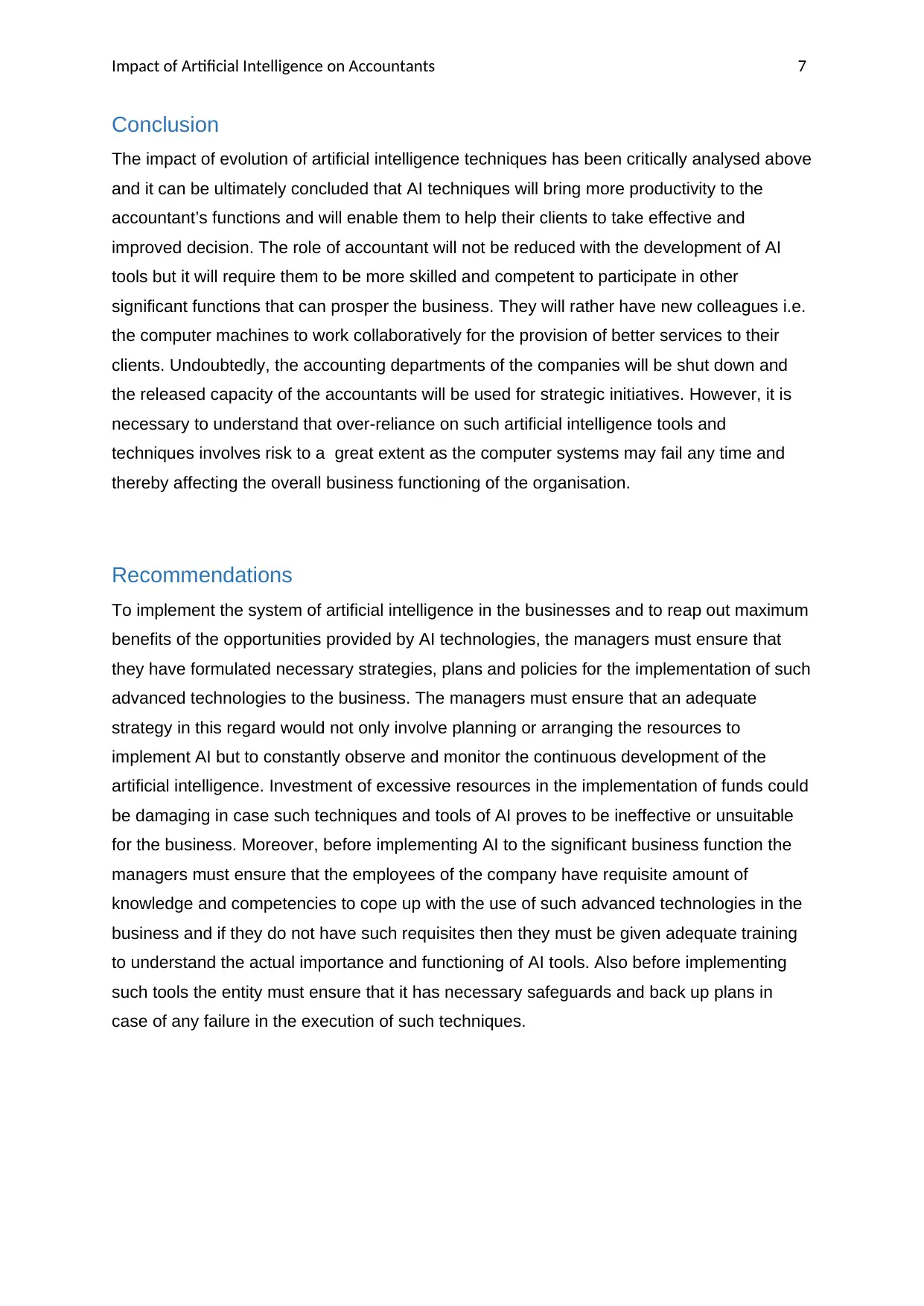
Impact of Artificial Intelligence on Accountants 7
Conclusion
The impact of evolution of artificial intelligence techniques has been critically analysed above
and it can be ultimately concluded that AI techniques will bring more productivity to the
accountant’s functions and will enable them to help their clients to take effective and
improved decision. The role of accountant will not be reduced with the development of AI
tools but it will require them to be more skilled and competent to participate in other
significant functions that can prosper the business. They will rather have new colleagues i.e.
the computer machines to work collaboratively for the provision of better services to their
clients. Undoubtedly, the accounting departments of the companies will be shut down and
the released capacity of the accountants will be used for strategic initiatives. However, it is
necessary to understand that over-reliance on such artificial intelligence tools and
techniques involves risk to a great extent as the computer systems may fail any time and
thereby affecting the overall business functioning of the organisation.
Recommendations
To implement the system of artificial intelligence in the businesses and to reap out maximum
benefits of the opportunities provided by AI technologies, the managers must ensure that
they have formulated necessary strategies, plans and policies for the implementation of such
advanced technologies to the business. The managers must ensure that an adequate
strategy in this regard would not only involve planning or arranging the resources to
implement AI but to constantly observe and monitor the continuous development of the
artificial intelligence. Investment of excessive resources in the implementation of funds could
be damaging in case such techniques and tools of AI proves to be ineffective or unsuitable
for the business. Moreover, before implementing AI to the significant business function the
managers must ensure that the employees of the company have requisite amount of
knowledge and competencies to cope up with the use of such advanced technologies in the
business and if they do not have such requisites then they must be given adequate training
to understand the actual importance and functioning of AI tools. Also before implementing
such tools the entity must ensure that it has necessary safeguards and back up plans in
case of any failure in the execution of such techniques.
Conclusion
The impact of evolution of artificial intelligence techniques has been critically analysed above
and it can be ultimately concluded that AI techniques will bring more productivity to the
accountant’s functions and will enable them to help their clients to take effective and
improved decision. The role of accountant will not be reduced with the development of AI
tools but it will require them to be more skilled and competent to participate in other
significant functions that can prosper the business. They will rather have new colleagues i.e.
the computer machines to work collaboratively for the provision of better services to their
clients. Undoubtedly, the accounting departments of the companies will be shut down and
the released capacity of the accountants will be used for strategic initiatives. However, it is
necessary to understand that over-reliance on such artificial intelligence tools and
techniques involves risk to a great extent as the computer systems may fail any time and
thereby affecting the overall business functioning of the organisation.
Recommendations
To implement the system of artificial intelligence in the businesses and to reap out maximum
benefits of the opportunities provided by AI technologies, the managers must ensure that
they have formulated necessary strategies, plans and policies for the implementation of such
advanced technologies to the business. The managers must ensure that an adequate
strategy in this regard would not only involve planning or arranging the resources to
implement AI but to constantly observe and monitor the continuous development of the
artificial intelligence. Investment of excessive resources in the implementation of funds could
be damaging in case such techniques and tools of AI proves to be ineffective or unsuitable
for the business. Moreover, before implementing AI to the significant business function the
managers must ensure that the employees of the company have requisite amount of
knowledge and competencies to cope up with the use of such advanced technologies in the
business and if they do not have such requisites then they must be given adequate training
to understand the actual importance and functioning of AI tools. Also before implementing
such tools the entity must ensure that it has necessary safeguards and back up plans in
case of any failure in the execution of such techniques.
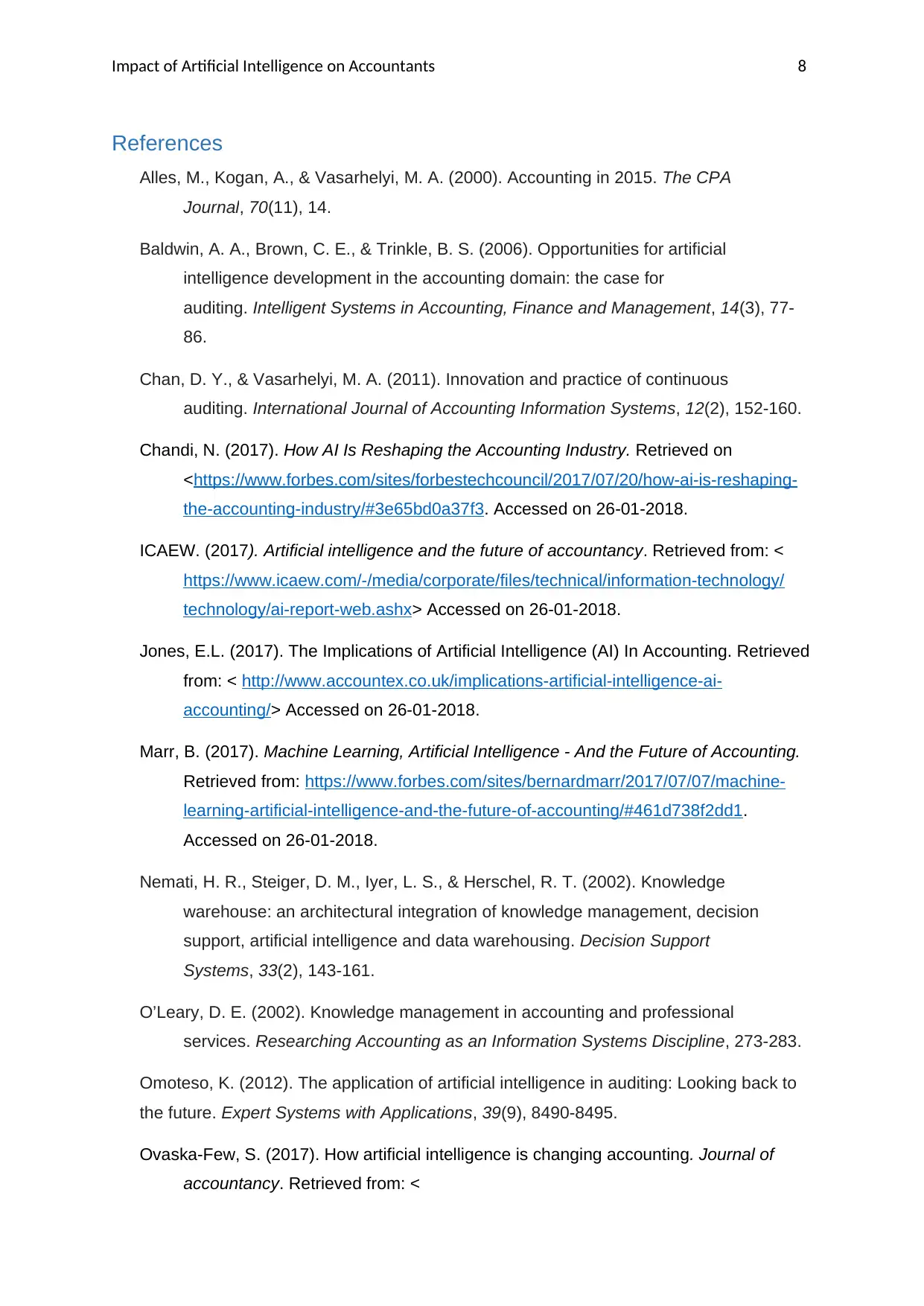
Impact of Artificial Intelligence on Accountants 8
References
Alles, M., Kogan, A., & Vasarhelyi, M. A. (2000). Accounting in 2015. The CPA
Journal, 70(11), 14.
Baldwin, A. A., Brown, C. E., & Trinkle, B. S. (2006). Opportunities for artificial
intelligence development in the accounting domain: the case for
auditing. Intelligent Systems in Accounting, Finance and Management, 14(3), 77-
86.
Chan, D. Y., & Vasarhelyi, M. A. (2011). Innovation and practice of continuous
auditing. International Journal of Accounting Information Systems, 12(2), 152-160.
Chandi, N. (2017). How AI Is Reshaping the Accounting Industry. Retrieved on
<https://www.forbes.com/sites/forbestechcouncil/2017/07/20/how-ai-is-reshaping-
the-accounting-industry/#3e65bd0a37f3. Accessed on 26-01-2018.
ICAEW. (2017). Artificial intelligence and the future of accountancy. Retrieved from: <
https://www.icaew.com/-/media/corporate/files/technical/information-technology/
technology/ai-report-web.ashx> Accessed on 26-01-2018.
Jones, E.L. (2017). The Implications of Artificial Intelligence (AI) In Accounting. Retrieved
from: < http://www.accountex.co.uk/implications-artificial-intelligence-ai-
accounting/> Accessed on 26-01-2018.
Marr, B. (2017). Machine Learning, Artificial Intelligence - And the Future of Accounting.
Retrieved from: https://www.forbes.com/sites/bernardmarr/2017/07/07/machine-
learning-artificial-intelligence-and-the-future-of-accounting/#461d738f2dd1.
Accessed on 26-01-2018.
Nemati, H. R., Steiger, D. M., Iyer, L. S., & Herschel, R. T. (2002). Knowledge
warehouse: an architectural integration of knowledge management, decision
support, artificial intelligence and data warehousing. Decision Support
Systems, 33(2), 143-161.
O’Leary, D. E. (2002). Knowledge management in accounting and professional
services. Researching Accounting as an Information Systems Discipline, 273-283.
Omoteso, K. (2012). The application of artificial intelligence in auditing: Looking back to
the future. Expert Systems with Applications, 39(9), 8490-8495.
Ovaska-Few, S. (2017). How artificial intelligence is changing accounting. Journal of
accountancy. Retrieved from: <
References
Alles, M., Kogan, A., & Vasarhelyi, M. A. (2000). Accounting in 2015. The CPA
Journal, 70(11), 14.
Baldwin, A. A., Brown, C. E., & Trinkle, B. S. (2006). Opportunities for artificial
intelligence development in the accounting domain: the case for
auditing. Intelligent Systems in Accounting, Finance and Management, 14(3), 77-
86.
Chan, D. Y., & Vasarhelyi, M. A. (2011). Innovation and practice of continuous
auditing. International Journal of Accounting Information Systems, 12(2), 152-160.
Chandi, N. (2017). How AI Is Reshaping the Accounting Industry. Retrieved on
<https://www.forbes.com/sites/forbestechcouncil/2017/07/20/how-ai-is-reshaping-
the-accounting-industry/#3e65bd0a37f3. Accessed on 26-01-2018.
ICAEW. (2017). Artificial intelligence and the future of accountancy. Retrieved from: <
https://www.icaew.com/-/media/corporate/files/technical/information-technology/
technology/ai-report-web.ashx> Accessed on 26-01-2018.
Jones, E.L. (2017). The Implications of Artificial Intelligence (AI) In Accounting. Retrieved
from: < http://www.accountex.co.uk/implications-artificial-intelligence-ai-
accounting/> Accessed on 26-01-2018.
Marr, B. (2017). Machine Learning, Artificial Intelligence - And the Future of Accounting.
Retrieved from: https://www.forbes.com/sites/bernardmarr/2017/07/07/machine-
learning-artificial-intelligence-and-the-future-of-accounting/#461d738f2dd1.
Accessed on 26-01-2018.
Nemati, H. R., Steiger, D. M., Iyer, L. S., & Herschel, R. T. (2002). Knowledge
warehouse: an architectural integration of knowledge management, decision
support, artificial intelligence and data warehousing. Decision Support
Systems, 33(2), 143-161.
O’Leary, D. E. (2002). Knowledge management in accounting and professional
services. Researching Accounting as an Information Systems Discipline, 273-283.
Omoteso, K. (2012). The application of artificial intelligence in auditing: Looking back to
the future. Expert Systems with Applications, 39(9), 8490-8495.
Ovaska-Few, S. (2017). How artificial intelligence is changing accounting. Journal of
accountancy. Retrieved from: <
⊘ This is a preview!⊘
Do you want full access?
Subscribe today to unlock all pages.

Trusted by 1+ million students worldwide
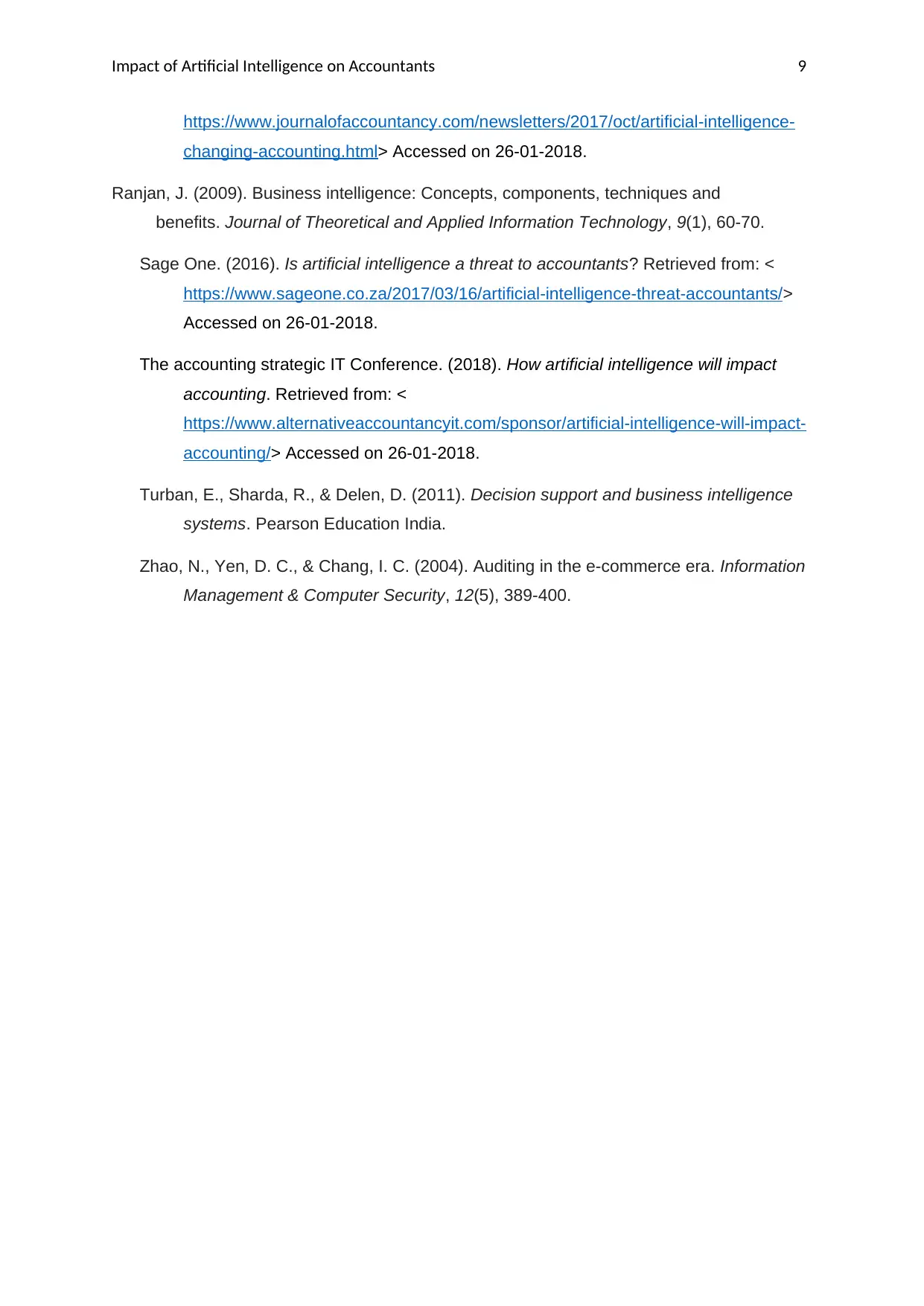
Impact of Artificial Intelligence on Accountants 9
https://www.journalofaccountancy.com/newsletters/2017/oct/artificial-intelligence-
changing-accounting.html> Accessed on 26-01-2018.
Ranjan, J. (2009). Business intelligence: Concepts, components, techniques and
benefits. Journal of Theoretical and Applied Information Technology, 9(1), 60-70.
Sage One. (2016). Is artificial intelligence a threat to accountants? Retrieved from: <
https://www.sageone.co.za/2017/03/16/artificial-intelligence-threat-accountants/>
Accessed on 26-01-2018.
The accounting strategic IT Conference. (2018). How artificial intelligence will impact
accounting. Retrieved from: <
https://www.alternativeaccountancyit.com/sponsor/artificial-intelligence-will-impact-
accounting/> Accessed on 26-01-2018.
Turban, E., Sharda, R., & Delen, D. (2011). Decision support and business intelligence
systems. Pearson Education India.
Zhao, N., Yen, D. C., & Chang, I. C. (2004). Auditing in the e-commerce era. Information
Management & Computer Security, 12(5), 389-400.
https://www.journalofaccountancy.com/newsletters/2017/oct/artificial-intelligence-
changing-accounting.html> Accessed on 26-01-2018.
Ranjan, J. (2009). Business intelligence: Concepts, components, techniques and
benefits. Journal of Theoretical and Applied Information Technology, 9(1), 60-70.
Sage One. (2016). Is artificial intelligence a threat to accountants? Retrieved from: <
https://www.sageone.co.za/2017/03/16/artificial-intelligence-threat-accountants/>
Accessed on 26-01-2018.
The accounting strategic IT Conference. (2018). How artificial intelligence will impact
accounting. Retrieved from: <
https://www.alternativeaccountancyit.com/sponsor/artificial-intelligence-will-impact-
accounting/> Accessed on 26-01-2018.
Turban, E., Sharda, R., & Delen, D. (2011). Decision support and business intelligence
systems. Pearson Education India.
Zhao, N., Yen, D. C., & Chang, I. C. (2004). Auditing in the e-commerce era. Information
Management & Computer Security, 12(5), 389-400.
1 out of 10
Related Documents
Your All-in-One AI-Powered Toolkit for Academic Success.
+13062052269
info@desklib.com
Available 24*7 on WhatsApp / Email
![[object Object]](/_next/static/media/star-bottom.7253800d.svg)
Unlock your academic potential
Copyright © 2020–2026 A2Z Services. All Rights Reserved. Developed and managed by ZUCOL.





